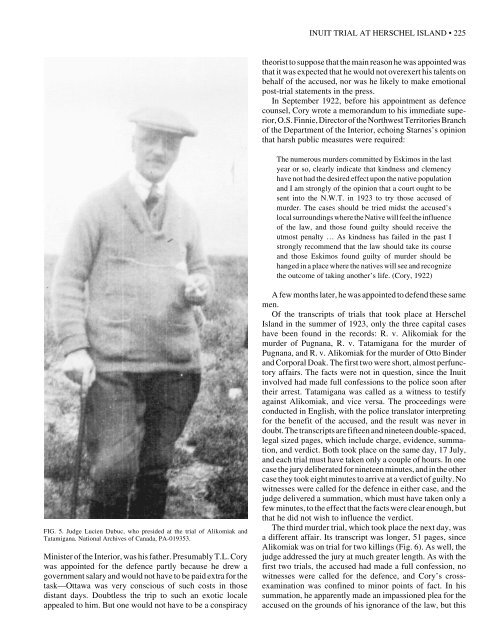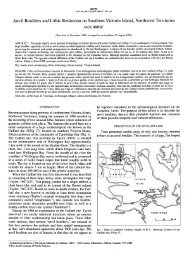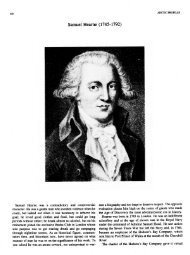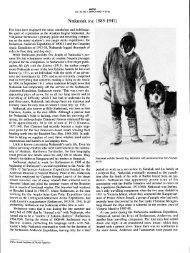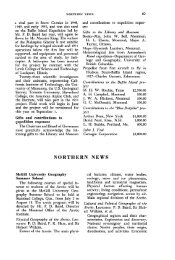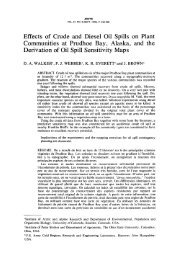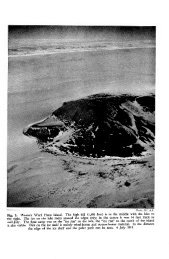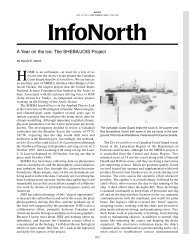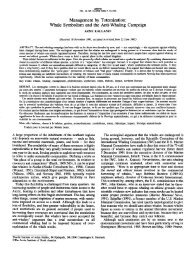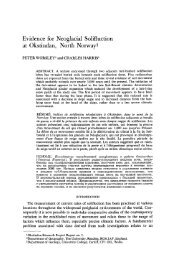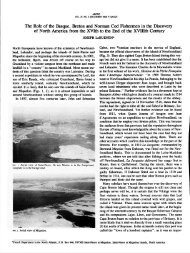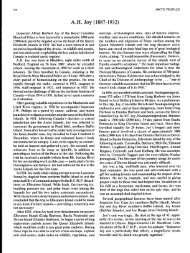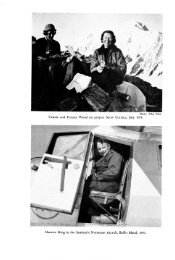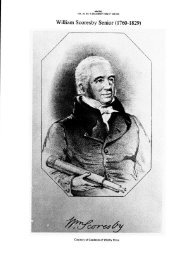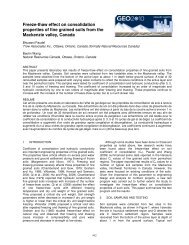To Make These Tribes Understand - AINA Publications Server
To Make These Tribes Understand - AINA Publications Server
To Make These Tribes Understand - AINA Publications Server
Create successful ePaper yourself
Turn your PDF publications into a flip-book with our unique Google optimized e-Paper software.
FIG. 5. Judge Lucien Dubuc, who presided at the trial of Alikomiak and<br />
Tatamigana. National Archives of Canada, PA-019353.<br />
Minister of the Interior, was his father. Presumably T.L. Cory<br />
was appointed for the defence partly because he drew a<br />
government salary and would not have to be paid extra for the<br />
task—Ottawa was very conscious of such costs in those<br />
distant days. Doubtless the trip to such an exotic locale<br />
appealed to him. But one would not have to be a conspiracy<br />
INUIT TRIAL AT HERSCHEL ISLAND • 225<br />
theorist to suppose that the main reason he was appointed was<br />
that it was expected that he would not overexert his talents on<br />
behalf of the accused, nor was he likely to make emotional<br />
post-trial statements in the press.<br />
In September 1922, before his appointment as defence<br />
counsel, Cory wrote a memorandum to his immediate superior,<br />
O.S. Finnie, Director of the Northwest Territories Branch<br />
of the Department of the Interior, echoing Starnes’s opinion<br />
that harsh public measures were required:<br />
The numerous murders committed by Eskimos in the last<br />
year or so, clearly indicate that kindness and clemency<br />
have not had the desired effect upon the native population<br />
and I am strongly of the opinion that a court ought to be<br />
sent into the N.W.T. in 1923 to try those accused of<br />
murder. The cases should be tried midst the accused’s<br />
local surroundings where the Native will feel the influence<br />
of the law, and those found guilty should receive the<br />
utmost penalty … As kindness has failed in the past I<br />
strongly recommend that the law should take its course<br />
and those Eskimos found guilty of murder should be<br />
hanged in a place where the natives will see and recognize<br />
the outcome of taking another’s life. (Cory, 1922)<br />
A few months later, he was appointed to defend these same<br />
men.<br />
Of the transcripts of trials that took place at Herschel<br />
Island in the summer of 1923, only the three capital cases<br />
have been found in the records: R. v. Alikomiak for the<br />
murder of Pugnana, R. v. Tatamigana for the murder of<br />
Pugnana, and R. v. Alikomiak for the murder of Otto Binder<br />
and Corporal Doak. The first two were short, almost perfunctory<br />
affairs. The facts were not in question, since the Inuit<br />
involved had made full confessions to the police soon after<br />
their arrest. Tatamigana was called as a witness to testify<br />
against Alikomiak, and vice versa. The proceedings were<br />
conducted in English, with the police translator interpreting<br />
for the benefit of the accused, and the result was never in<br />
doubt. The transcripts are fifteen and nineteen double-spaced,<br />
legal sized pages, which include charge, evidence, summation,<br />
and verdict. Both took place on the same day, 17 July,<br />
and each trial must have taken only a couple of hours. In one<br />
case the jury deliberated for nineteen minutes, and in the other<br />
case they took eight minutes to arrive at a verdict of guilty. No<br />
witnesses were called for the defence in either case, and the<br />
judge delivered a summation, which must have taken only a<br />
few minutes, to the effect that the facts were clear enough, but<br />
that he did not wish to influence the verdict.<br />
The third murder trial, which took place the next day, was<br />
a different affair. Its transcript was longer, 51 pages, since<br />
Alikomiak was on trial for two killings (Fig. 6). As well, the<br />
judge addressed the jury at much greater length. As with the<br />
first two trials, the accused had made a full confession, no<br />
witnesses were called for the defence, and Cory’s crossexamination<br />
was confined to minor points of fact. In his<br />
summation, he apparently made an impassioned plea for the<br />
accused on the grounds of his ignorance of the law, but this


